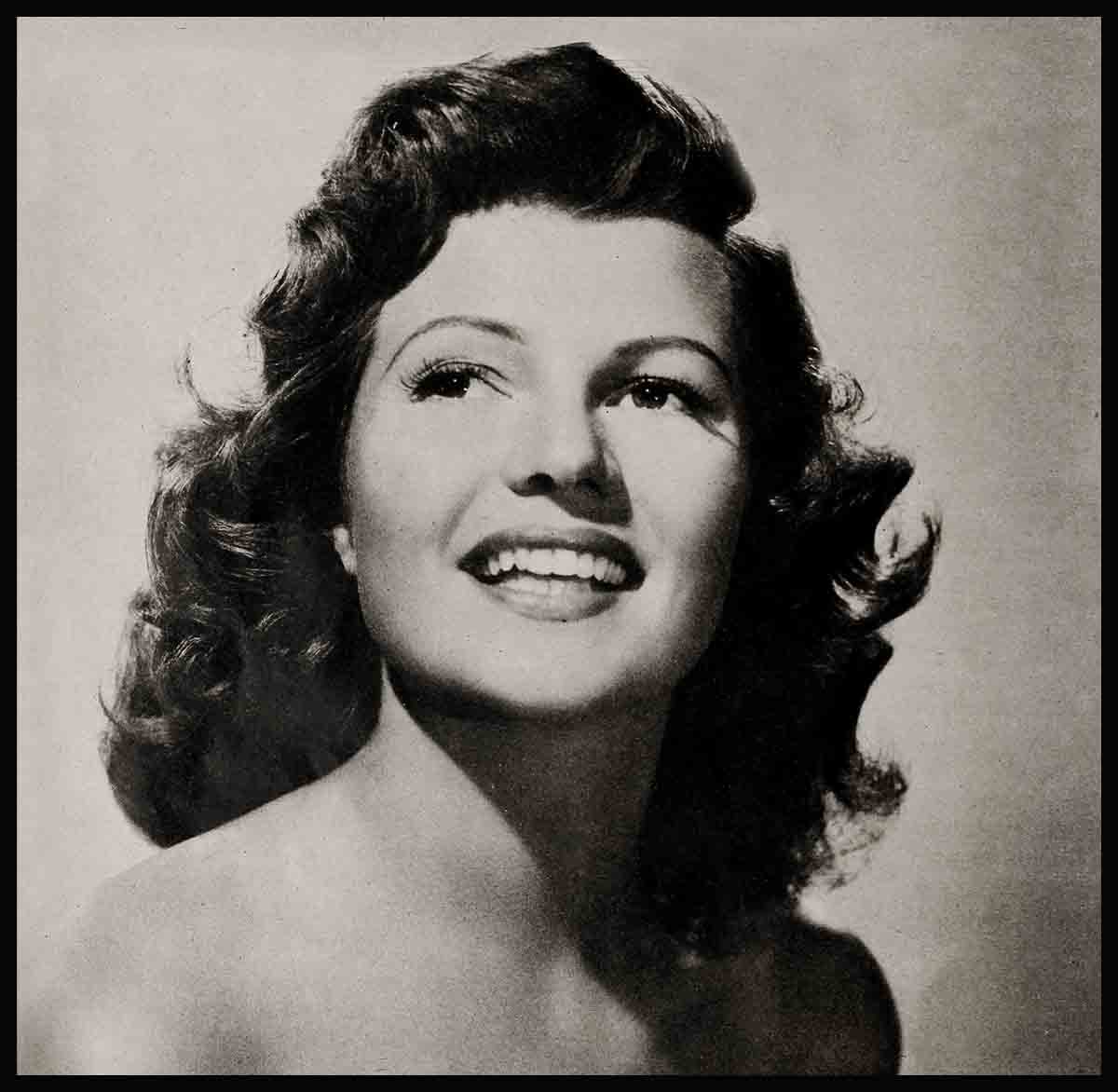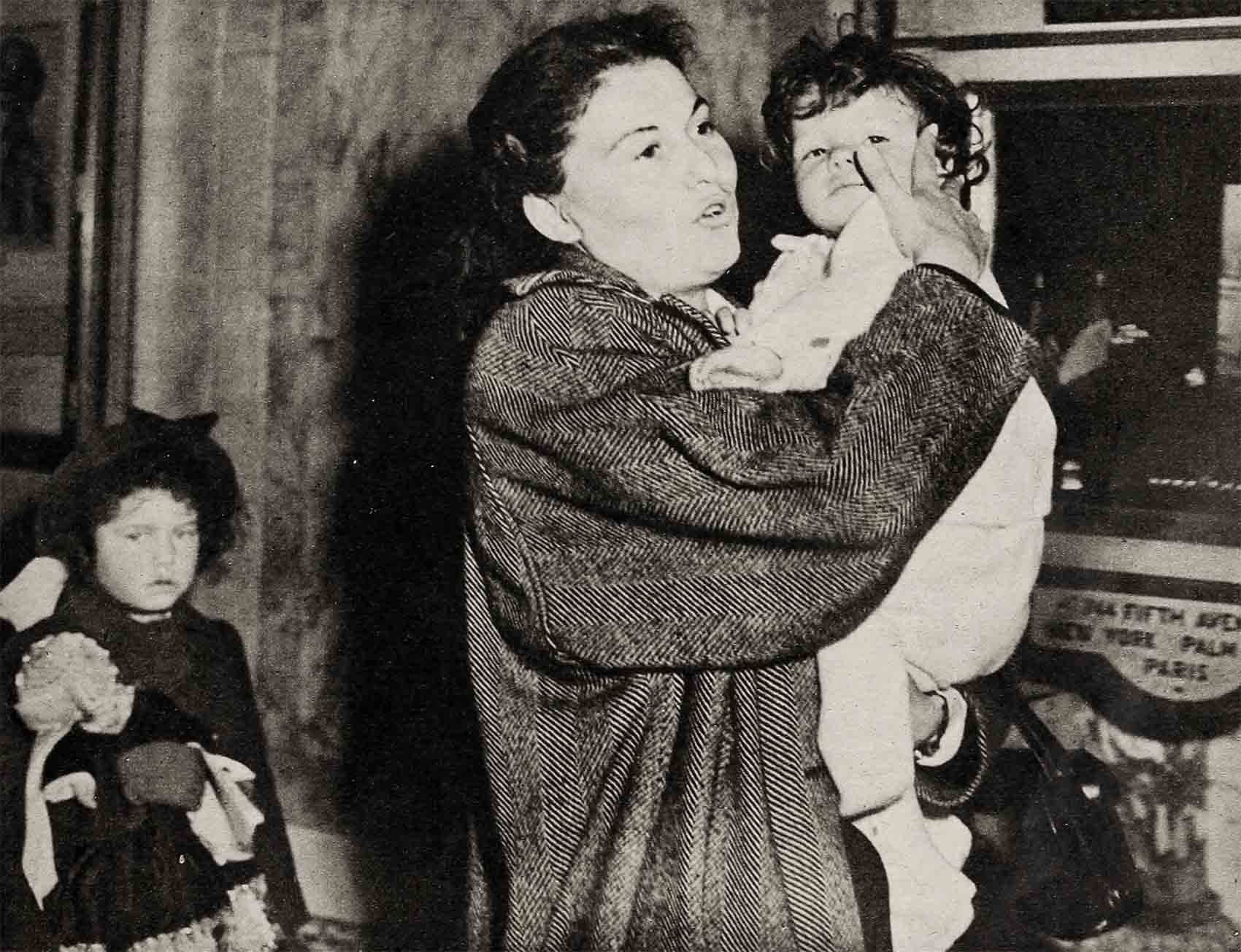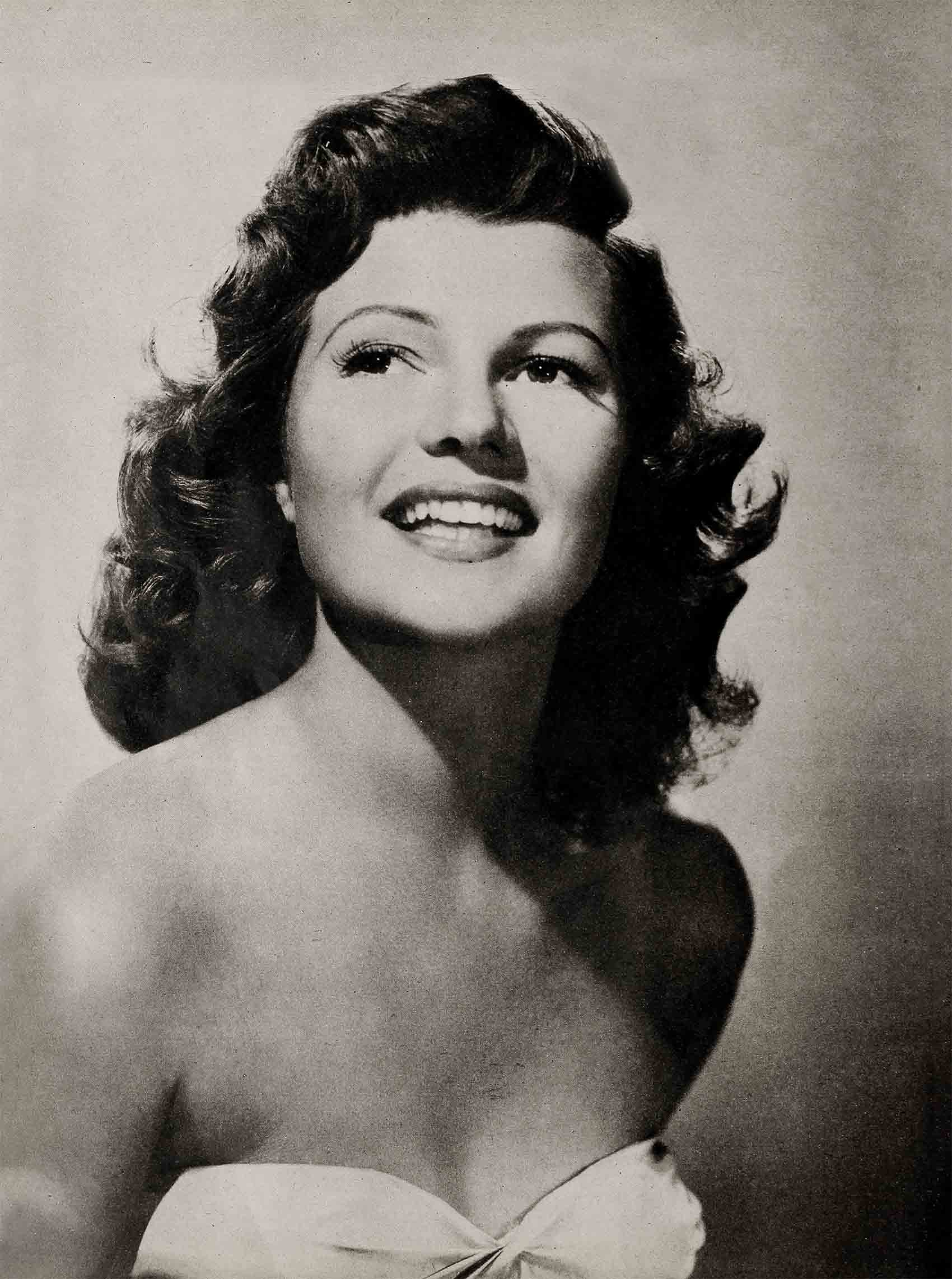
Rita Hayworth’s Forgotten Child
A bored little girl shuffled through the steps of the Seguidilla and brought her castanets to a languid stop.
“Rebecca Welles! Please do it right, just once, for me, then you may go.”
Eduardo Cansino’s pretty, hard-working, second wife, Pat, was again entreating Rita Hayworth’s older daughter to work with the rest of the children in the Saturday dancing class. Rebecca thrust out a defiant chin and went through the steps again, mechanically.
Her hair was carelessly combed and her brown and white checked gingham dress was not particularly becoming. There was no spark of interest or pleasure in her brown eyes.
Across the room, with Rita’s housekeeper and two nurses, Rebecca’s step-sister, the Princess Yasmin, sat quietly watching the class.
Yasmin, an exquisite little creature, was dressed just as a baby Princess should be dressed. She wore a handmade, pink, French organdy dress. Her softly curled hair shone from careful brushing and her pink hair ribbon was placed just right.
None of the dancing class mothers or nursemaids seemed to pay attention to the tragic difference between these two daughters of Rita Hayworth. The doting mamas on the sidelines watched their own darlings. Many of them, and a large portion of the American public, have forgotten, perhaps, that Rita Hayworth has an older child named Rebecca.
Suddenly, Rebecca’s face brightened. Grandpa (Rita Hayworth’s father) had come into the room. He beckoned and she darted to his side and put a trusting hand in his. Eduardo Cansino is a kindly man who has worked hard for all of his fifty-odd years. He loves and understands children. A few minutes later, Rebecca was laughing in the tiny kitchenette, while Grandpa was fixing her a cheese sandwich.
The Cansino dancing studio swarms with children. Eduardo goes through class after class, pointing his stick, demonstrating intricate steps. Between classes, he tucks his castanets into his belt, sits briefly at his desk and goes over his accounts. Some stars are very slow to pay for their children’s lessons. Eduardo’s life is not easy. “It is strange. They expect me to carry their accounts when they are not working, but so often when they are successful they are too busy to remember to pay me.”
Perhaps Eduardo is the most normal influence in the lives of Rita’s children. Simple, unassuming, he is a man with natural sympathy for the awkwardness of kids, and takes pleasure in encouraging them. His pupils adore him, and most of the youngsters knock themselves out trying to please him.
At Grandpa’s studio, Rebecca has a chance to be with other children like any normal eight-year-old. “Normal” is a word that could not be used to describe the life of the little girl up to now. Before she was born, on December 17, 1944, Rita had announced that she wanted a boy “just like his daddy—another Orson.”
Rebecca’s proud father declared that he wanted seventeen children. Nothing was said, then, about Christopher, his daughter by his first wife. Christopher is now eighteen and lives in North Africa with her mother, who is remarried to a British diplomat. Even Orson’s best friends admit that he never has contributed consistently to the support of Christopher, although he has shown great interest in her during recent years and carries on a steady correspondence with her. He has displayed a similar attitude toward Rebecca, contributing little or nothing, financially, but showing concern for her welfare.

Even in the beginning, a hectic life eddied around Rebecca. During her first year of life, her parents raged and quarrelled. When Rebecca was four months old, Mrs. Volga Hayworth Cansino died, and Rita was grief-stricken.
Work became an escape for the film star. Rita wanted to forget her personal life. She became feverishly active. A few days after Rebecca’s first birthday, Rita told reporters she would keep working with the “exception of a few days during the Christmas holidays” which she planned to devote to her daughter.
Rita has always professed devotion to Rebecca. She has a great deal in common with other working mothers who are constantly torn from their children. Some of Rita’s yearning that things might be different came out in her statement following her divorce from Orson Welles.
“Right now there is a young person named Rebecca Welles who means more to me than career or anything else. I will always be grateful that I have her. You don’t know what it means to me to come home and have her put her arms around me and hug me. She’s awfully smart, too.”
Rita’s alleged romance with Haymes is one of the latest items of Hollywood gossip—and it is amazing how much of that gossip is known tc the small fry of Beverly Hills, who repeat to each other morsels overheard at home. Ugly reality and cynical wisdom can come during childhood in this tinselled town, and more than one famous parent has come to the point of asking, “What have I done?”
Rita, as everyone knows, has made mistakes of judgment, but not of the heart. No one knows how she may have suffered during the long hours of the night. Surely, her intention has not been to harm Rebecca.
Rita’s turbulent existence—the demands of her career and her need to rest and relax between pictures—has kept her away from Rebecca four to six months of every year of the child’s life. Yet she listened attentively five years ago to the counsel of Dr. Maurice Bernstein, a surgeon in Beverly Hills, who has been Rebecca’s doctor since she was born and her former guardian. He advised Rita, “You are leaving Rebecca alone too much. I would suggest you spend more time with her. She cannot grow up normally and develop as she should without the love and attention of her mother. I feel that a child needs the closeness of her parents, and I strongly advise you to spend more time with Rebecca.”
Rita probably did not intend to ignore Dr. Bernstein’s advice. But her personal life was becoming more complicated and she was on her way to Europe again.
While she was abroad, the doctor and his wife, Hazel, did all that they could for Rebecca. The child’s serious little face would light up when Dr. Bernstein made his daily visits. He provided toys and gifts from Orson Welles, who is the doctor’s best friend. The doctor also brought drawings made by Orson in Paris, which delighted Rebecca, who enjoys a talent for art. The little girl must have felt that she was loved, even in her mother’s absence. During the period that Rita was making international headlines, the doctor brought Rebecca steel bars, paints and brushes, a swing and a sandbox.
Rita provided every necessity and luxury for Rebecca, and did little to attempt to collect from Orson Welles the $50 weekly support awarded by the court. Frank Belcher, the attorney who represented Rita at that time, says that to the best of his knowledge the sum due Rita is now almost $15,000. Rita would never press Orson for the money, knowing that times were difficult for him.
Neither attorney Belcher nor Dr. Bernstein ever see the film star any more. Dr. Bernstein just shakes his head sadly and says, “Something has happened to that girl. What, I don’t know. I am not allowed to see Rebecca any more, and I love her like my own. I write; I wire; all my communications are ignored. I don’t know if the letters and gifts I send on to Rebecca from her father ever reach her. There is a wall. Rita seems to be so suspicious now.”

When did the change in Rita begin? It is difficult to tell. She seldom associates with any of her old friends any more. Even so, her co-workers are still loyal to her and only reluctantly admit that she has changed.
Millions of words were written about Rita’s mad fling with the still-married Aly Khan, just as the presses are rolling now with stories about the still-married Dick Haymes. But in the midst of her idyll with Aly, Rita dashed home, took Rebecca and her nurse and kept them with her for several months.
While Rebecca was traveling with her mother, her father hoped for a chance to see her. When he learned that they were at Aly’s Chateau L’Horizon, Orson sent Rita a wire stating that he wanted to see his daughter and giving the time of his intended arrival. He practically bought out the Paris toy shops. But when he reached thechateau, Rita, Rebecca and Aly were gone. Orson waited two days for Rebecca to return, amusing himself by playing with the toys he had brought. He waited in vain.
Finally, there was the belated wedding of Rita and Aly on May 27, 1949, six and one-half months before the royal birth of Princess Yasmin in Lausanne, Switzerland, on December 28, 1949.
This event was regarded as so important that it stopped traffic in Lausanne and made banner headlines in newspapers all over the world. There was some criticism of Rita by church and women’s groups, but there was no condemnation of Rita at home by Dr. Bernstein. He waited patiently, regarding the Aly episode as a “fling.” He hoped that Rita would have time for Rebecca, now that she no longer toiled before the cameras.
Instead, Rebecca was packed off to Gstaad, Switzerland, with her nurse shortly before Princess Rita’s regal accouchement. The advent of Yasmin completely eclipsed Rebecca. Months went by while Rebecca waited in a lonely hotel for her mother to return. Meanwhile, the world press spewed millions of words over the birth of the Princess Yasmin.
Finally, in February, 1950, Rita and Aly joined Rebecca in Gstaad, and she no longer played alone in hotel corridors.
But the months that followed were no happier than before. Rita and Aly led a tumultuous life. Rita’s old complaint against Orson—“he was not interested in making a home”—was also directed against Aly. Does Rita now see twice-married Dick Haymes as her future defender of the home?
While she decides, Princess Yasmin, the $3,000,000 baby, and Rebecca are at home with the servants. Rita said that she needed a rest. She had been working hard at the studio for the last year. When she is making a picture, there is little time for her family. If she has an early call, she seldom can see the children before she goes to work. When she is not working, she sleeps late.
Only on weekends, when the warm, family-loving Cansinos gather at Rita’s house for Sunday dinner, are they really together. When Rita is depressed and mistrustful of the glittering existence she has. sought—then she turns to her family. And they come—father, aunts, uncles, brothers and in-laws. In Hollywood, where dependent relatives are the rule, Rita’s family is a well-known exception.
It is a pity that Rita, who came from such a warm and loving family, has not succeeded in duplicating such a home life for herself. She has complained loudly of her husbands’ lack of interest in “home life.” Has she ever shown them what a loving home life is like? When she is busy with her torrid romances, doesn’t she neglect her family?
Rebecca has needed protection from stupid people. More often than Princess Rita cares to remember, little Rebecca has overheard such careless remarks as, “Isn’t it a shame she isn’t as pretty as Yasmin? . . . too bad, she looks just like Orson . . . well, at least, people say she’s smart. . . .”
Thoughtless “friends” have said these things. Rita’s secretary, Margaret Parker, has shuddered as she saw the impact on little Rebecca, who has grown more and more silent, more and more given to bursts of temper and outright rebelliousness.
But four years ago Rita thought she had gilt-edged insurance on happiness for herself and Rebecca with marriage to the Prince of the Moslem world.
When Rita married Aly Khan her father remarked, “Now, all we know about Rita is what we read in the papers.” Then he wrapped up a bottle of perfume and mailed it to his daughter as a wedding present.
Family ties were renewed when Rita came home with Rebecca and Yasmin in tow. Rumor has it that she was absolutely broke. According to the stories, the film queen had spent her entire fortune during her two-year tenure as Princess Margarita, and she had to borrow $50,000 from her agents to get started again.
Even her hope for a settlement on the Princess Yasmin came to nothing. All she has is an empty court order awarding her $48,000 annually for Yasmin’s support, signed by Judge A. J. Mastretti in a Reno courtroom. Announcement of the award drew this comment from her father-in-law, the Aga Khan: “Aly need not pay one penny, as the court order applies to Nevada, and, at most, to America, where Aly has no money.”
Rita finds herself in the same position as thousands of other American mothers who are divorced and unable to collect support for their children from their ex-husbands. Fortunately, she has enough earning years left to be able to compensate for some of the income she has lost. But this film star has much more to recover than her fortune.
Rebecca Welles lives in her mother’s shadow. When Rita devotes herself to making her daughter’s life happier, she may find more contentment in her own life. Rita will learn that the sparkle in her child’s eyes can outshine Aly’s diamonds, her own name in lights, and the fleeting glow of romance.
THE END
—BY THELMA McGILL
It is a quote. MODERN SCREEN MAGAZINE NOVEMBER 1953




